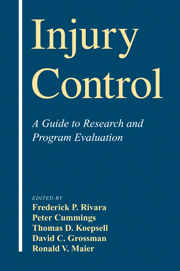Book contents
- Frontmatter
- Contents
- List of Contributors
- 1 An Overview of Injury Research
- 2 Classifying and Counting Injury
- 3 Measurement of Injury Severity and Co-morbidity
- 4 Data Linkages and Using Administrative and Secondary Databases
- 5 Rates, Rate Denominators, and Rate Comparisons
- 6 Data Collection Methods
- 7 Selecting a Study Design for Injury Research
- 8 Qualitative Methods in Injury Research
- 9 Randomized Trials
- 10 Cohort Studies in Injury Research
- 11 Case–Control Studies in Injury Research
- 12 Ecologic Studies
- 13 Case Series and Trauma Registries
- 14 Systematic Reviews of Injury Studies
- 15 Evaluating an Injury Intervention or Program
- 16 The Development of Clinical Decision Rules for Injury Care
- 17 Trauma Performance Improvement
- 18 Measuring Disability and Quality of Life Postinjury
- 19 Economic Evaluation of Injury Control
- 20 Ethical Issues
- Index
20 - Ethical Issues
Published online by Cambridge University Press: 16 October 2009
- Frontmatter
- Contents
- List of Contributors
- 1 An Overview of Injury Research
- 2 Classifying and Counting Injury
- 3 Measurement of Injury Severity and Co-morbidity
- 4 Data Linkages and Using Administrative and Secondary Databases
- 5 Rates, Rate Denominators, and Rate Comparisons
- 6 Data Collection Methods
- 7 Selecting a Study Design for Injury Research
- 8 Qualitative Methods in Injury Research
- 9 Randomized Trials
- 10 Cohort Studies in Injury Research
- 11 Case–Control Studies in Injury Research
- 12 Ecologic Studies
- 13 Case Series and Trauma Registries
- 14 Systematic Reviews of Injury Studies
- 15 Evaluating an Injury Intervention or Program
- 16 The Development of Clinical Decision Rules for Injury Care
- 17 Trauma Performance Improvement
- 18 Measuring Disability and Quality of Life Postinjury
- 19 Economic Evaluation of Injury Control
- 20 Ethical Issues
- Index
Summary
Ethical Principles
Injury control research, like any other research involving the collection of information from or about human beings, is guided by ethical principles (International Guidelines for Ethical Review of Epidemiological Studies, 1991). These principles have evolved during the twentieth century beginning with the Nuremberg Code (US Government Printing Office, 1949) to the Helsinki Convention (World Medical Assembly, 1964, 1975) to the Belmont Report (National Commission for the Protection of Human Subjects of Biomedical and Behavioral Research, 1978) and including the International Conference on Harmonisation of Technical Requirements for Registration of Pharmaceuticals for Human Use (Baber, 1994). They include the principles of respect, beneficence, and justice.
The principle of respect, sometimes referred to as autonomy is the proposition that researchers should treat potential research subjects as autonomous and respect their choices. Individuals, for example, have the right to decide for themselves whether or not to become subjects of a human research experiment. The principle of respect also recognizes that some people may have limited autonomy because of developmental, chronic, or acute diminished capacity, and that they are entitled to special protections when they are asked to take part in research activities.
The principle of beneficence requires that the potential benefits to society of a research activity must outweigh the foreseeable risks to those who would be subjects of that research. Researchers are obligated by this principle to conduct their research so as to minimize the possible harm to subjects that may result and to maximize the potential benefits to individual subjects and to society.
Keywords
- Type
- Chapter
- Information
- Injury ControlA Guide to Research and Program Evaluation, pp. 283 - 296Publisher: Cambridge University PressPrint publication year: 2000



